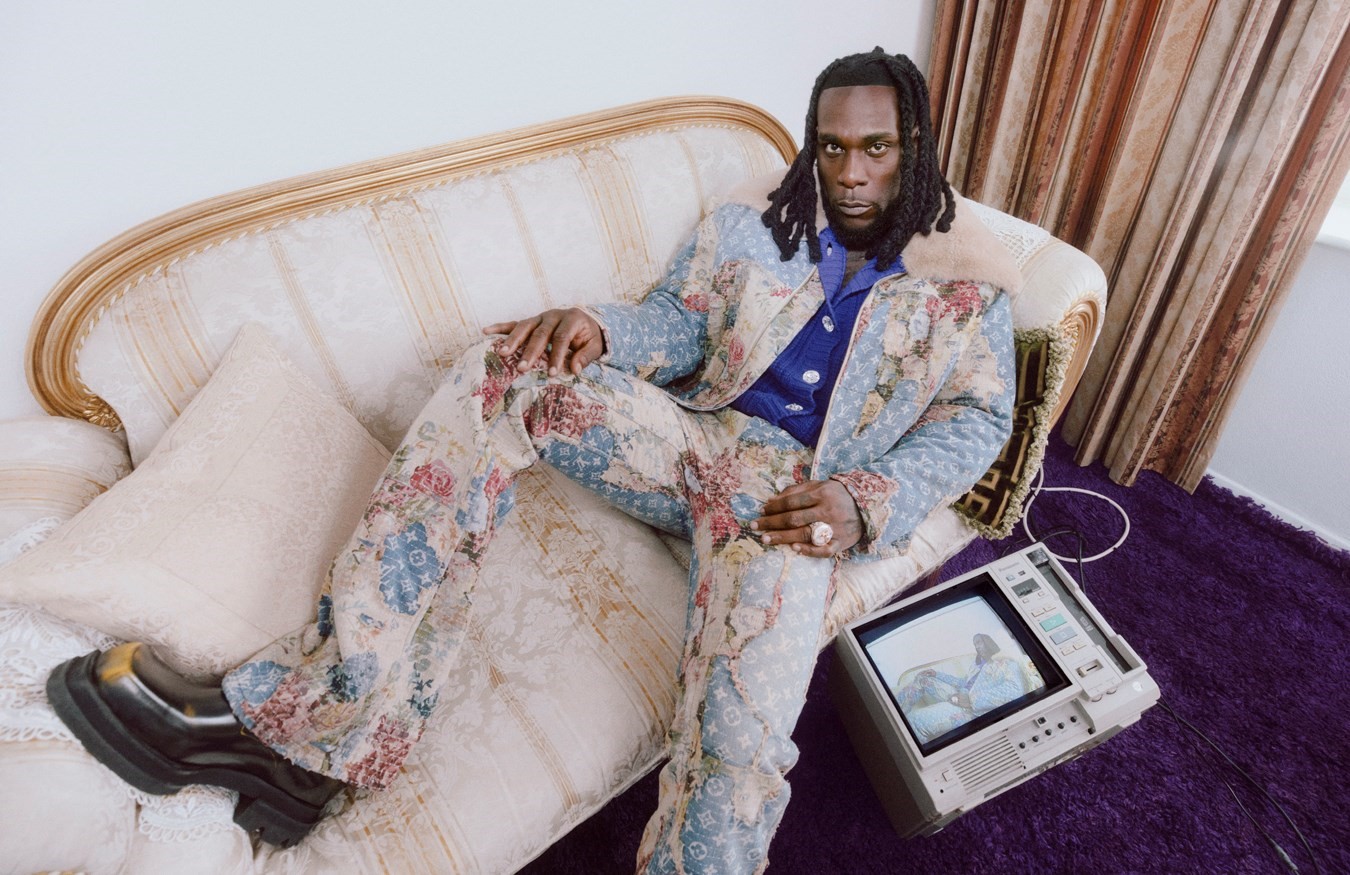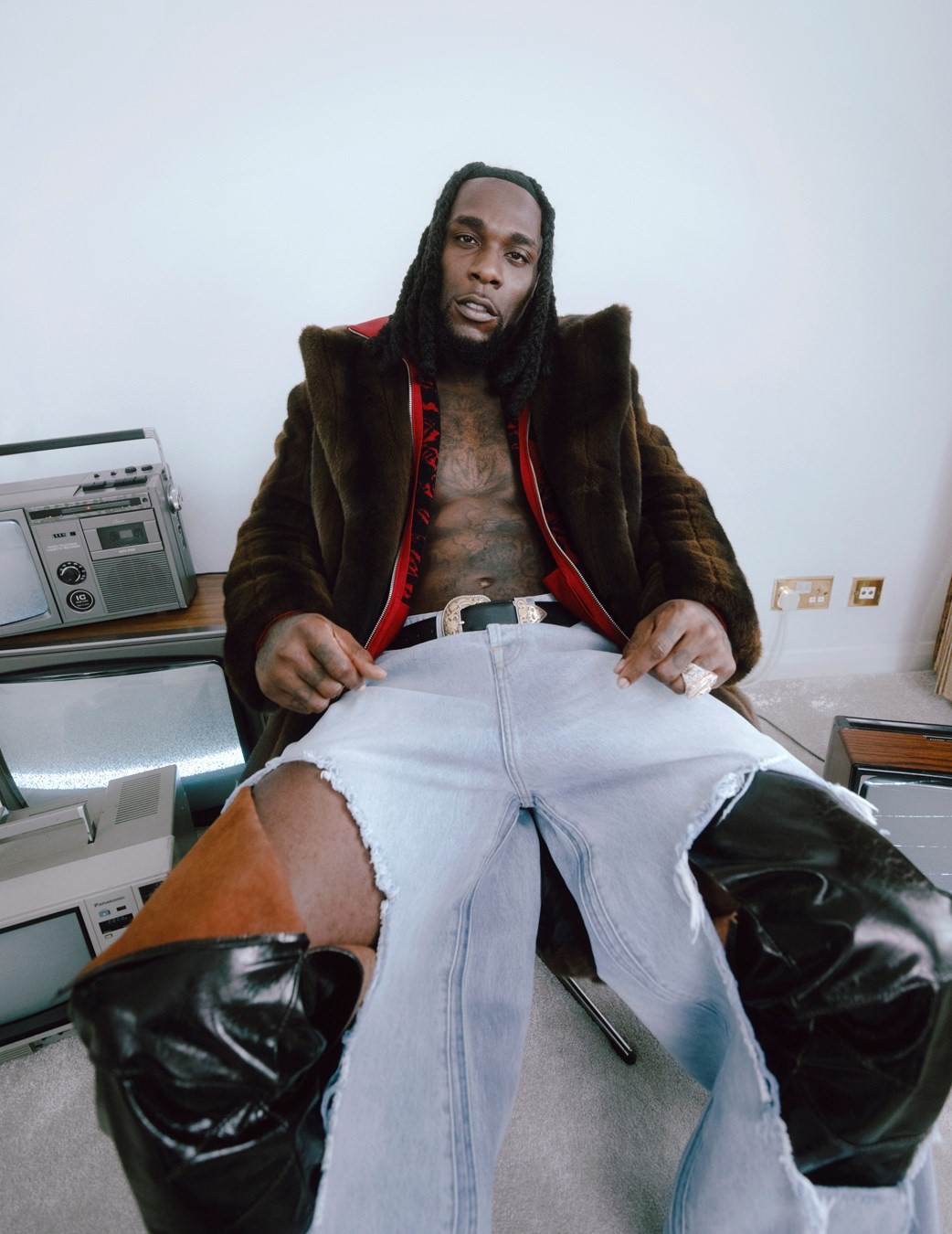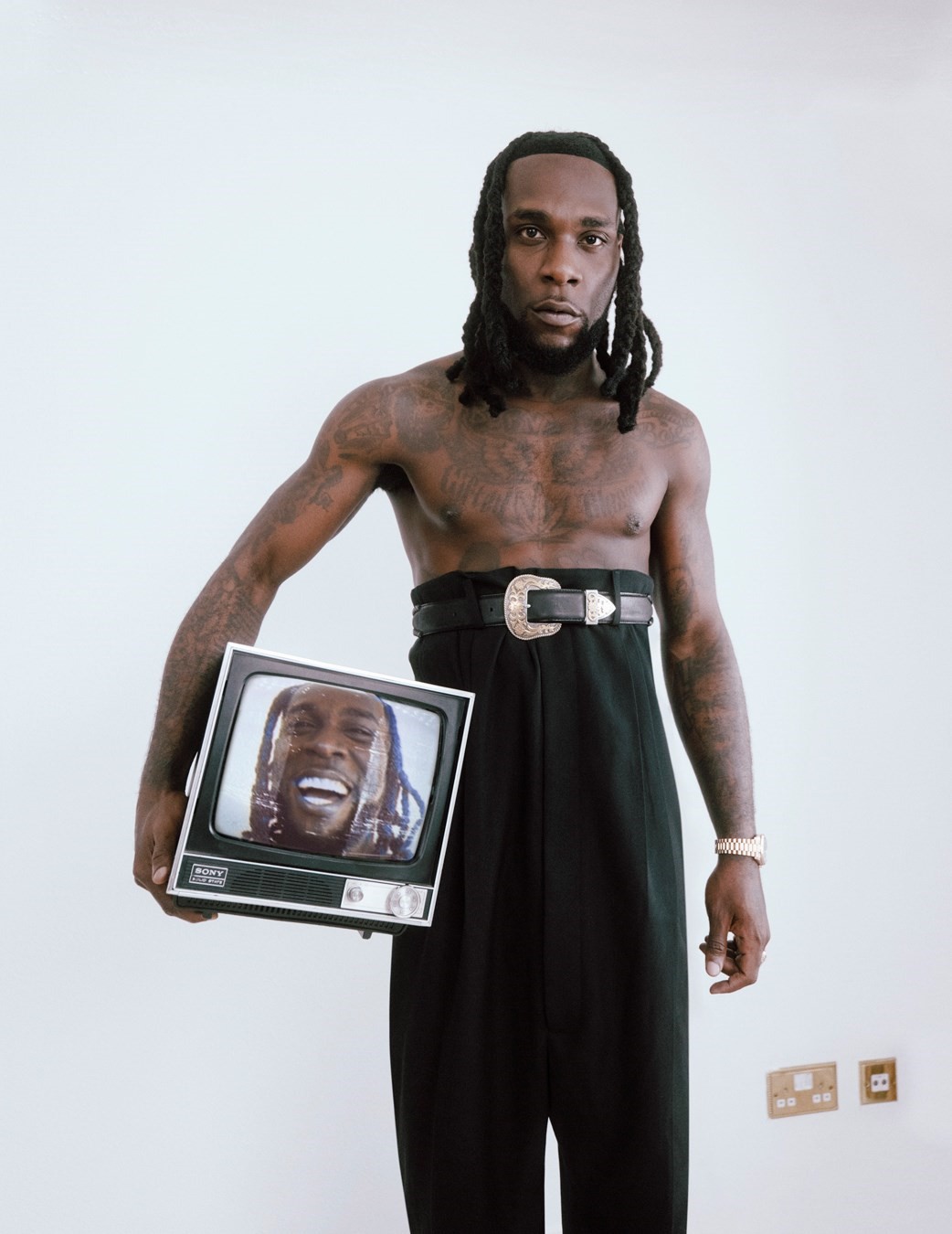Taken from the autumn 2022 issue of Dazed. You can buy a copy of our latest issue here
When you step off the plane, arrive at a new destination, and the veil of night is slowly being pulled across the sky, the new morning often feels like an experience that awakens a part of you that had been sleeping before. The night before the morning after, Burna Boy headlined Tipsy, one of Barbados’s premier soca festivals – and today, it really does feel good to feel the grass beneath your feet.
All it took was 24 hours in Bridgetown for the boy out of Port Harcourt, Nigeria to realise he dreamed of one day owning a house a stone’s throw from Rihanna’s family home on the island’s prestigious Sandy Lane. It wasn’t the palm tree-lined boulevards that swayed him, but the view out onto the vast nothingness of the Caribbean Sea. “I could really live here one day, I might have to make it happen,” he says.
It made sense as I looked out on to the ocean from his villa. Confronted with such a view, all of the meaningless things in life we worry about daily fall away like dead leaves in the autumn. Here, there are no debates about which sound Burna is inspired by or the incessant churn of the digital rumour mill. Just stillness, and a beautiful quiet.
There’s no easy way to write a profile on a man who is as enigmatic as he is charismatic. The truth he gives you has to be taken at face value, no matter your perceptions. Access to artists in contemporary music journalism is much more controlled and guarded in today’s media landscape. He laughs as he says that interviews tend to be a lose-lose situation most of the time: “Whatever I say, even if it’s the truth, you guys will spin it.”
An artist’s journey to peace isn’t a straight road, perhaps even less so for someone of Burna’s status. In an Afrobeats-fusion sense, he is unquestionably a legacy artist, but to the wider world, it was 2018’s Outside and especially African Giant (2019) which propelled him into a higher stratosphere. But if you asked anyone in the dance ten years ago, you knew the time was coming, just not when.
The villa the musician is staying at during his short time on the island feels a world away from the rest of Bridgetown; this is a place where you truly come to play and relax. The drive up around the winding private roads of Sandy Lane offers a sense of peace, which Burna Boy suggests is what he wants and needs. The ocean feels endlessly wide and deep enough for all the bullshit to sink in.
For someone only recently arrived at the cusp of global stardom, Burna Boy is already fed up with this aspect of the business. This is not news, and he’s made it clear in the past that he’s not fond of interviews. The way he sees it, his new album, Love, Damini, offers a more graceful window into his mind. “I tried to use this album to allow people to get closer to me,” he says.
“My music will be here long after I’m gone, even after my children’s children. It’s a stamp in time for those who have a reality like mine” - Burna Boy
Burna’s fanbase has been growing for over a decade now. Someone joked on Twitter that he was the Thanos of Afrobeats – not because he’s a galactic despot, but because, like the Marvel character, Burna was teased for years to a mainstream audience, before Outside established him as a titan of the genre. It was an added bonus that the project featured two enduring hits with “Ye” and “Sekkle Down”, the latter featuring regular collaborator J Hus, who helped introduce him to UK audiences.
The night before we sit down to chat, Burna Boy’s first visit to a Caribbean island had been a big success. Much has been made of Afrobeats vying for supremacy with dancehall, but these reductive and often asinine arguments fail to acknowledge how Black music moves across borders, especially in the internet age. These exchanges existed long before dancehall and Afrobeats, and have done so since the movement and displacement of Black people from Africa. At this point, Burna Boy’s name is being used as cannon fodder for an issue that quite simply doesn’t really exist. Still, Burna’s appearance at Tipsy was a moment of celebration for all those in attendance. If Burna was looking for reasons as to why he does this, he found them in the festival crowd’s euphoric response; “Last Last” was reloaded five times before he continued to perform the whole song. If that’s not telling of the global influence of his music, I’m not sure what is.

Back at Burna’s villa, a bit of conversational chess is required to break the ice. The musician looks composed, though his experiences with the media of late haven’t exactly been positive: there’s been a lot of contortion as to what he has and hasn’t said. It begins lightly. “This album was coming from a personal standpoint, and it was about me, d’you understand?” he explains. “Me talking to myself and in the process talking to you. It’s probably one of my most important [statements] because it felt like I was in school writing something and putting it in a time capsule.”
Burna Boy’s audience is so broad, globally speaking, that even his fans haven’t yet come to an agreement over what his music is inspired by – even when he’s been open and transparent on the subject. He’s referred to himself as an ‘African giant’ on multiple occasions; symbolically, it has an empowering effect and, if anything, it’s not to be taken as something political. Just this summer, police escorts attached to the singer were charged with attempted murder after shooting two people at a Lagos nightclub. His camp hasn’t responded to claims from a woman who was with the victims that the altercation was escalated by the security detail. But Burna Boy has never been shy about his life and what goes on in it: indeed, he touches on his prison time when he lived in the UK during our conversation. He says that the public can decide who he is because Burna Boy, by all accounts, has come to terms with his own mortality.
“I tend to be misunderstood and the reason why is because I’ve never really given anyone a chance to know who I am, and that’s what I tried to do,” he explains. For his new record, that all changed; on the closing title track, for example, he delivers a heartfelt ode to the people who have been influential in his life, while reckoning with some of his own demons. “This is just how I cry, I don’t know how else to do it and that’s how it’s always been,” he says of the track. As Burna suggests, Love, Damini is the singer’s most honest account of his life to date; he’s not interested in giving us a rose-tinted portrait. “I’ve got to the point where I don’t even care. Whoever it’s meant is who it’s meant for,” Burna says with the naturally laid-back cadence of a true Nigerian, his accent suddenly at its thickest. He’s much more comfortable than he was 15 minutes ago.
“My thoughts don’t matter [on SARS]. I’m not going to encourage young people to lose their lives any more. When something is ready to happen, it will happen. With understanding comes readiness for action” - Burna Boy
In the dining room of the villa, he sits at the head of the table, wearing a Boston Celtics jersey. Naturally, I shift the conversation towards the NBA. Burna tells me he considers Greek-Nigerian player Giannis Antetokounmpo an African giant also. Antetokounmpo, who has expressed strong pride in his Nigerian roots, had his surname changed from Adetokunbo by Greek authorities on his arrival to Europe as a young child. Now, he’s an NBA champion and two-time MVP, an example of the same unstoppable will to succeed as Burna.
On the intro monologue to another track on the album, “Whiskey”, a Port Harcourt resident speaks candidly about the pollution suffocating the city, which is Nigeria’s oil capital. Burna talks softly about people drinking milk as it’s believed to help reduce the impact of the soot from oil pollution in the air. “There’s no exaggeration in the song – the air is black, everything is dark because of oil and gas. That’s what this album is, it’s a really personal album as a human being.”
Moments before I arrive, Burna sits at the head of the table with his boys, smoking, talking and taking his surroundings in. If anything, Burna imagines a world where he doesn’t have to address sociopolitical issues in his music. While he’s still very much wedded to his hometown, as he reckons with his past on Love, Damini, he’s also clearing room for a new, illuminating future. Besides, he’s already played a crucial and monumental role in creating clear pathways between Afrobeats and dancehall, learning from those that came before to help guide global Black music into an unmapped tomorrow.

Burna Boy stresses that he doesn’t want to be considered political anymore, and never really wanted to in the first place. If anything, Burna Boy may be better described as an antihero within the global conversation of Afro-fusion and Afrobeats, and there are many shades to his interior world – some more enviable than others. “My thoughts don’t matter around that,” he says, when asked about #EndSARS and 2020’s uprising of young Nigerians against police corruption. “Nothing is going to change. It just is what is… I’m not going to encourage any young people to lose their lives senselessly anymore, d’you understand? When something is ready to happen, it will happen. I understand that now. You can’t jump into something that you don’t fully understand, even with our country. With understanding comes readiness for action.”
After we’re briefly interrupted by the chef reading out the lunch menu, Burna Boy jokes that he can’t wait to see how people, and the media specifically, spin what he just said. When the protests were unfolding in 2020, Burna called them “the most important moment in Nigeria’s history” – but two years on, it’s truly hit home that the comparisons with his idol, Afrobeat pioneer and political activist Fela Kuti, will always be a disservice, because of how the role and perception of an artist have changed since the height of his popularity in the 1970s. Burna Boy is now much more concerned with working quietly and speaking his truth. “The only time it matters for me to tell my truth is in my music; otherwise it just gives people more to misunderstand or turn into entertainment.”
The release of the album, Burna’s sixth to date, was timed around his 31st birthday celebrations – for him, an opportunity for reflection. “Track one [“Glory”] and the outro [from the album], they’re really letters to my future and past selves,” he confesses. “I’m shedding light on personal things that I haven’t really touched on before,” he says. At this point in his career, Burna doesn’t have to be bold in his approach to crafting a thematic album, but it’s arguably his most well-received project in recent years. The universally loved “Last Last” is reflective of the artist’s success recently; Burna’s melodies hit harder backlit with deeply personal insight like this. Still, it’s a daring strategy to use a Toni Braxton sample from a song about ‘ain’t-shit’ men and find a way to make it hit.
As time passes in our meeting, Burna Boy lets his guard down a little; on occasion, you can even see the sparkle in the smile (sometimes quite literally – he has a couple of gems decorating his teeth). An artist like him doesn’t get to where he is without a level of charisma that can hold an entire festival, let alone a room. In those small pockets of time, where that sparkle shines, he seems to find some peace.
From our brief time together today, it’s clear that how Burna presents himself publicly is his authentic self. If the past couple of years have taught him anything, it’s that joy and peace are paramount – and that the pursuit of it is a lifelong journey worth taking. “My music will be here long after I’m gone, even after my children’s children’s children. It’s a stamp in time for those who have a reality like mine,” Burna Boy says. “That’s what I care about.”
Burna Boy believes that legacy is important, especially in light of what he’s already achieved with his music (“Afrofusion started in a treehouse in Port Harcourt, so you never know where it’ll be tomorrow”). He thinks about death a lot, and what you leave behind as an artist. “Everyone will move the fuck on when I die,” he says. “This will be OK without me.” And after a conversation about life with someone he’d never met before, in a setting he’s not entirely comfortable being in, Burna Boy is as open, and existential, as he gets. The great beyond powers his music – and he’s not about to spoil the ride.
Hair JASMINE DALE, make-up MARIE BRUCE using CLÉ DE PEAU BEAUTÉ, barber ADAM HONEYGHAN, nails SIMONE CUMMINGS at CLM, set design MAX RANDALL, photographic assistants FELIX TW, LEWIS ROBINSON, styling assistants FELIX PARADZA, ANDRA-AMELIA BUHAI, EMILY JONES, EMILY GLEESON, ARIELLE NEUHAUS GOLD, digital operator NEIL BENNETT, set design assistant GRACE SNELLOCK, production 360PM
Join Dazed Club and be part of our world! You get exclusive access to events, parties, festivals and our editors, as well as a free subscription to Dazed for a year. Join for £5/month today.










